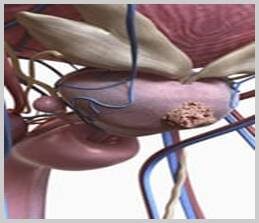
Prostate Cancer
Prostate cancer is one of the most commonly diagnosed cancers in men. It affects the prostate gland, located under the bladder and in front of the rectum. This gland among other functions, helps produce nourishment for the semen, and allows sperm to move effectively. Although prostate cancer can be a life-threatening diagnosis, it more often spreads slowly and requires minimal treatment. When confined to the prostate gland, it can usually be treated effectively, making early detection crucial to improve outcomes.
Risks Factors for Prostate Cancer
Although, the specific cause of developing prostate cancer is unknown, a combination of hereditary, hormonal and environmental factors is suspected to contribute. Factors that contribute to men to be at higher risk for developing prostate cancer, include:
● Age—risk increase at 65 and older
● Smoker now or in past
● African-American
● Family history of prostate cancer in first degree relative
● Diet high in fat and sugar
● Obesity
Symptoms of Prostate Cancer
Most patients with prostate cancer do not have any symptoms while it is in the early stages of the disease. As the disease progresses, however, patients may experience some of the following:
● Trouble urinating
● Slowing of urine stream
● Starting and stopping while urinating
● Blood in the urine
● Swelling in legs
● Bone pain particularly spine and/or pelvis
● Loss of appetite or weight
Diagnosis of Prostate Cancer
In addition to a physical examination, there are several lab and diagnostic tests that are used to diagnose prostate cancer:
● Digital rectal exam to feel for abnormalities
● Urinalysis
● Prostate-specific antigen (PSA) test
● MRI imaging
● Biopsy
A biopsy determines how much of the prostate is affected with cancer and the grading of the prostate cancer to determine how aggressive it is. This can help to guide treatment options.
Treatment of Prostate Cancer
Treatment is most effective when prostate cancer is identified at an early stage, before it has metastasized outside of the prostate. The best treatment method depends on the age, overall health of the patient, grade of the tumor, stage of the cancer and patient preference.
Active Surveillance
With an early diagnosis of prostate cancer, active surveillance may be recommended as an effective strategy. During active surveillance, the cancer is carefully monitored for signs of progression. This may include checking PSA values frequently, MRI imaging and repeating a biopsy at specified intervals.
Surgery
Surgery may be recommended to treat certain prostate cancers. This procedure is often able to be completed robotically in many cases which helps reduce the recovery.
Radiation
Radiation therapy is a very effective option for treating many prostate cancers. Radiation beams are used to target the affected area of the prostate gland.
Hormone Therapy
Prostate cancer is fueled by testosterone. Hormone therapy (ADT) is used to decrease testosterone from being released, and to prevent it from promoting the growth of the prostate cancer cells.
Chemotherapy
Chemotherapy may be used to treat prostate cancer. Chemotherapy uses drugs to stop cells from dividing, slowing the growth of the tumor.
In some cases, doctors may prescribe a combination treatment plan, which uses several of the treatments listed above.
Prevention of Prostate Cancer
Although the risks for prostate cancer cannot be completely prevented, patients can reduce their risk factors by maintaining an active and healthy lifestyle. Among the many modifiable risk factors, diet and lifestyle changes have been shown to reduce the risk of prostate cancer's development and disease progression. This can also help improve quality of life.
